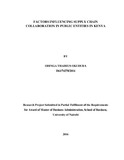| dc.description.abstract | The study sought to establish the extent of Supply Chain Collaboration, and determine factors influencing Supply Chain Collaboration in Public Sector in Kenya. The target was national government public entities in Kenya. Primary data was acquired through semi-structured questionnaires and descriptive statistic was used to analyse the quantitative data with tools such as frequencies, mean, standard deviation, regression and factor analysis; while content analysis (verbatim explanations) was applied on qualitative data. The study found that majority of national government public entities are engaged in the Supply Chain Collaboration to a greater extent. Correlation of the factors that influence SCC established a weak to moderate relationship which was a confirmation that the factors are indeed independent and suitable since they give a reflection of the population. Five factors that influence Supply Chain Collaboration were identified through factor analysis. They include: technology; informational sharing; regulation; trust and governance. An examination of the relationship confirmed these findings and established that the five variables jointly account for 60.2% of Supply Chain Collaboration. In conclusion, regression analysis revealed that three out of the five factors identified; technology, information sharing and regulations were the most significant factors for supply chain collaborations in public sector in Kenya implying a strong relationship between these factors and SCC. Public entities should ensure that there is adequate technological infrastructure, high level of information sharing and progressive regulations in order to enhance competitiveness through SCC. Improvement in Supply Chain Collaboration can be nurtured through partnerships; creativity; awareness; regulations, performance and contracting. The study recommends that public entities should enhance greater Supply Chain Collaboration with other industry players in order to improve their service delivery to the public in Kenya and be competitive in general. According to the research there is need for the government to source for adequate funds to invest in technological infrastructure so as to reap maximum benefits of Supply Chain Collaboration. More studies should be done in Supply Chain Collaboration and government invest more in research and development to enhance the strategy. The study was limited by cost and time constraints. Further research should focus on the public entities under county governments in Kenya. The scope could be extended to include either the private and public entities in Kenya or public entities in other East African countries. Further studies should be conducted to establish the correlation between Supply Chain Collaboration and Supply Chain Management legislations. | en_US |



